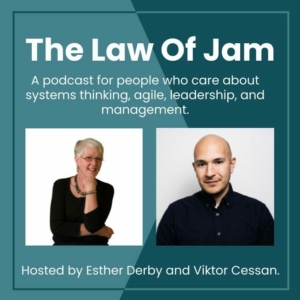Podcast – Tea and The Law of Raspberry Jam
 |
| Esther Derby and I host a podcast in which we talk about coaching, systems, management, and whatever else catches our attention. Catch the latest episodes of our podcast below or subscribe to our podcast on iTunes, Spotify, or Podbean. |
17 – Generalists and specialists, and learningIn this episode we continue our conversation and exploration of learning in organizations and we look at generalists and specialists partially from a learning point of view. We also talk about the implications of the trend with the decreasing number of generalists in tech. |
16 – Explicit and implicit knowledgeLot’s of factors contribute to this. However, there is a common thread. There’s almost always an overemphasis on what to do and how to do it. Why something works, when to do it, and when to make adjustments get little if any attention. This is the difference between explicit and implicit knowledge–and that’s what we talk about in this episode. |
15 – Provoking Learning in Organizations.The download that we talk about in the episode is available here. |
14 – Exiting Systems.In this episode, we share our thoughts around how to leave, why it matters, and we share some practical tips. |
13 – Help the System see the System with Reflective Observations.In episode 11, we talked about Observing systems and in this episode, we explore using Reflective Observation as a way to help a system see the system. By using interviews and observations, we help people see patterns and gaps clearly. Thus, they can choose their own actions to improve which in our experience leads to greater buy-in compared to prescriptions from an outside “expert”. However, how do you engage in reflective observations? How do you make sense of what you see and hear? How do you present it to the system? Those are just a few of the things we cover in this episode. |
12 – Accumulating Sorrow and Network TraumaWe, humans, are greatly influenced by the people around us. Our social networks affect our behavior and emotions. They can be a source of support buoying us up. But what happens when most of your network is in the same distress? When sorrows pile on, the whole network can spiral into trauma. In this mini-episode, we’ll talk about what you can do if you are in an organization that is experiencing a cumulative accumulation of sorrow and network trauma. |
11 – Observing SystemsAt any given time a lot goes on in systems. But how we observe systems makes a huge difference in the way we interact with them and ultimately in the value we can provide for clients. When we’re not conscious about how we observe systems, we run around dizzy hoping to make important observations. Even if we are aware of what needs to be observed, it’s challenging. So just exactly how does one observe systems? And what does it even mean to observe a system? That’s what we talk about in this episode. We also have some bonus content for you this time! We created a downloadable mindmap that contains the things you can pay attention to that were mentioned in the episode. |
10 – Coaching Past ResistanceIn this episode, we’ll share our experiences of “inflicted help” and offer ideas on shifting the dynamic to a better outcome. |
9 – Coaching Teams That Do Not Want To Be CoachedWhat gets labeled “resistance” is really a response to that ever is being proposed. In our latest episode, we talk about the downside of labeling responses as resistance we share our experiences of resistance and offer ideas that can help you shift from division and resistance to partnerships that move forward. |
8 – Entering SystemsIn this episode we’re shifting focus a bit–but still, we come back to questions. The questions that we ask ourselves, and some that you might ask for self-reflection. |
7 – Asking Better Questions – AssumptionsClick here to download the Questions and Assumptions, and Homework mentioned in this episode. |
6 – Asking Better Questions – How Different Structures Of Questions WorkWe’ve created a short download with example questions. Download it here. |
5 – Asking Better Questions – IntentionsIn this episode, the first in a series of episodes about asking better questions, we go through 9 different intentions that we’ve found helpful when working with groups. We’ve also created a Questions Intentions Worksheet in which we list and describe intentions and give several examples of them. Download it here. |